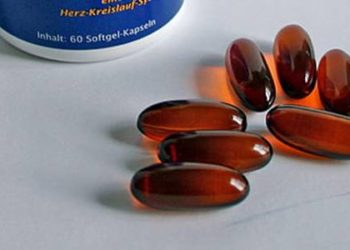Omega Fatty Acids and Lutein + Zeaxanthin did not improve cardiovascular outcomes
Image: PD
1. Omega(w)-fatty acids + macular xanthophylls supplementation did not improve primary composite outcome of cardiovascular (CV) mortality and morbidity.
Evidence Rating Level: 2 (Good)
Study Rundown: Several trials have investigated the effects of w-fatty acids on cardiovascular (CV) outcomes. More recent trials seem to point towards a lack of benefit on CV mortality. This study is a randomized clinical trial designed to examine the impact of w-fatty acids and macular xanthophylls on progression to advanced age-related macular degeneration. As part of the trial, an ancillary study called the Cardiovascular Outcome Study (COS) was created with a factorial-designed randomized trial to evaluate the impact of w- fatty acids and macular xanthophylls on a primary composite outcome of myocardial infarction (MI), stroke, and cardiovascular death. The investigators found no significant improvement in the primary or secondary outcomes with the use of w-fatty acids or macular xanthophylls. The strengths of the study include the randomized placebo controlled design, high follow-up rates, and the use of rigorous adjudication. However, readers should be aware that the study is primarily powered to detect a change in macular degeneration. Therefore, the sample size would have been inadequate to detect significant differences in singular outcomes such as rates of myocardial infarction. Therefore, a broader composite primary outcome had to be used.
Click to read the study, published today in JAMA Internal Medicine
Relevant Reading: n–3 Fatty Acids and Cardiovascular Outcomes in Patients with Dysglycemia
In-Depth [randomized controlled trial]: This study is an ancillary study (COS) of the Age-Related Eye Disease Study 2 (AREDS2). Patients who met the criteria for the AREDS2 study but also had stable coronary artery disease were eligible to participate. A total of 4203 patients were recruited at 82 centers. They were randomized to one of four primary arms: placebo, Lutein + Zeaxanthin (Macular xanthophylls), DHA + EPA (w- fatty acids), or w- fatty acids + Macular Xanthophylls. The median length of follow-up was 4.8 years. There was no significant decrease in the primary outcome in either the w-fatty acid group (HR, 0.95; 95% CI, 0.78-1.17), the macular xanthophylls group (HR, 0.94; 95% CI, 0.77-1.15), or the combined w- fatty acids + macular xanthophylls group (HR, 089; 95% CI, 0.67-1.19). The same was true for composite secondary end points as well.
©2012-2014 2minutemedicine.com. All rights reserved. No works may be reproduced without expressed written consent from 2minutemedicine.com. Disclaimer: We present factual information directly from peer reviewed medical journals. No post should be construed as medical advice and is not intended as such by the authors, editors, staff or by 2minutemedicine.com. PLEASE SEE A HEALTHCARE PROVIDER IN YOUR AREA IF YOU SEEK MEDICAL ADVICE OF ANY SORT.







